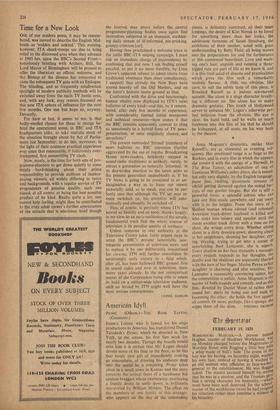American Idyll
PICNIC. ..(Odeon.)—THE Rosa TA1700. (Gaumont.) JOSHUA Lobst4,• who is famed for his stage productions in America, has transferred Daniel Taradash's Picnic, which he directed in New York, to the screen, his first film work for nearly two decades. Though the boards would miss him it is certain that Mr. Logan should devote more of his time to the floor, as he has that lovely rare gift of immediately evoking an atmosphere, ,of drawing his audience deep into the ,world he, is conjuring. Picnic takes place in a small town in Kansas and the story concerns the ,arrival there of a handsome but aimless braggart whose exuberance, overlaying a frantic desire to settle down. is. brilliantly interpreted by William Holden. The effect on the members of one family of this stranger, who appears on the day of the community
picnic, is delicately contrived; all their inner longings, the desire of Kim Novak to be loved for something more than her looks, . the adolescent torments of Susan Strasburg, the ambitions of their mother, acted with great understanding by Betty Field, all being woven into the preparations for and the furtherance of this communal bean-feast. Love and wash- ing one's hair, anguish and running a three- legged race are part of life as we know it, and it is this fruit salad of dreams and practicalities which gives the film such a remarkably realistic flavour. A little too obvious, like corn, to suit the subtle taste of this piece, is Rosalind Russell as a jealous sex-starved spinster. She alone is a stage character breath- ing a different air. She alone has to make dramatic gestures. This touch of Hollywood serves to enhance Mr. Logan's otherwise per- fect isolation from the obvious. His eye is clear, his hand bold, and he wafts so much freshness into this film of his that he should be kidnapped, at all costs, on his way back to the theatre.
*
Anna Magnani's dramatics, unlike Miss Russell's, are as elemental as erupting vol- canoes. Her emotional range is as huge as the Rockies, and in every film in which she appears she covers it with the energy of a Harwell. In The Rose Tattoo, an adaptation of one of Tennessee Williams,'s sultry plays, she is tamed, but only very slightly, by the English language; those fine, rushing, passionate streams of vitriol getting dammed against the sourld bar' riers of our gentler tongue. But she is still ti powerful force, a splendid actress who can take any film made anywhere and run away with it to the heights. From this story of a Sicilian woman whose adored (and tattooed) American truck-driver husband is killed and who sinks into misery and squalor until she meets another truck driver with a rose on his chest, she wrings every drop. Whether sitting about in a dirty dressing-gown, shouting abuse at her neighbours, shaming her daughter, cry' ing, praying, trying to get into a corset Of entertaining Burt Lancaster, she is superb. Every shadow on her face transmits a message. every eyelash responds to her thoughts, the depths and the shallows arc accurately bhartcd with the turn of her finger. Marisa Pavan aster daughter is charming and' also sensitive, Mr. Lancaster a reasonably convincing suitor, but the competition is unfair. Anna Magnani is the master of both tragedy and comedy, and as this film, directed by Daniel Mann at rather than round her, starts by being one and ends hY becoming the other, she holds the fort against all collier's. Or more, perhaps, like a sponge, she


































 Previous page
Previous page